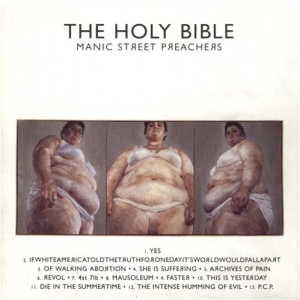
Welcome to a special Tuesday afternoon blog post. Today, it's another in thegeneral's occasional "Blast From The Past" series in which an album or artist that really means something special, is put under the musical microscope and probed, for reasons.
Today, I'm once again handing over the relay baton to my compadre theexistentialist - who wanted to write a piece about an album that is, unbelievably, 21 years old this year - Manic Street Preacher's "The Holy Bible". Thank you, once again for another brilliant post and for talking about a record that means a lot to anyone who grew up in the early 90s.
+++
Manic Street Preachers – The Holy Bible
thegeneral’s tea-drinking buddy (well, we do other things besides drinking tea, but I’ll not mention that here in case our mothers are reading), theexistentialist has decided to do a “Blast From The Past” post (whilst drinking a big mug of tea).
For this post, I’m going to tell you about the Manic Street Preachers 3rd LP, The Holy Bible. This is theexistentialist’s all-time favourite album… well, probably. I can think of a lot of other albums that I like a lot. But this is the one that I am always drawn back to.
The Holy Bible was released in 1994 – pub-quiz-type-music-fact-fans: In fact, it was released on the same day as Oasis’ debut Definitely Maybe. And, in 1996, the Manic Street Preachers reached their commercial zenith, with their 4th album, Everything Must Go, which latched on to the BritPop zeitgeist. However, prior to this, back in 1994, the Manic Street Preachers were in a self-destructive mood, and released this - one of the most uncompromising and harrowing albums of all-time.
It was, of course, the last album they recorded with Richey Edwards, and it is impossible to listen to it, without reading it as his suicide note. But, really, that is a shame, as it means the album is not appreciated for the astonishing recording that it is, since it has become wrapped-up in the myths surrounding his disappearance.
The Holy Bible is intense, and grabs the listener, and literally forces them into the dark, fearful and bleak world that Richey inhabited. It is ferocious, angry; but behind the wall of noise, it has an all too obvious tortured and tormented soul.
The Holy Bible is a work of art; since, in some ways, it is a concept record. This is an album that could never have produced a hit single, not just because the songs are uncompromising, harrowing, and unrelentingly bleak, but because they work best, and only really make sense and reach their emotional depth within the context of the album as a whole.
Like a concept album, the listener is drawn deeper and deeper into the world and sound of the record. Unlike a concept record, there is no overarching theme, linking each track. However, the mood and tone, and sequencing draw the listener into the tortured heart of the album. Rather than focusing on one single concept to hold the album together, The Holy Bible is held together by the sheer intensity of the atmosphere and its emotional depth.
It is the album I keep coming back to, because whatever mood I’m in, it seems to resonate. If I’m angry, the rage and fury of The Holy Bible provides a release. If I’m depressed, the bleak despair of The Holy Bible is a comforting expression of I feel. I love the album and it bears repetition, it probably is my all time favourite record.
No comments:
Post a Comment